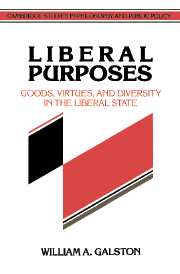Book contents
- Frontmatter
- Contents
- Acknowledgments
- PART I LIBERALISM AND POLITICAL PHILOSOPHY
- PART II LIBERALISM AND NEUTRALITY
- 4 Liberalism and the neutral state
- 5 Liberalism and neutral public discourse
- 6 Moral personality and liberal theory
- 7 Pluralism and social unity
- PART III LIBERALISM WITHOUT NEUTRALITY
- PART IV FROM THEORY TO PRACTICE IN THE LIBERAL STATE
- Notes
- Index
7 - Pluralism and social unity
Published online by Cambridge University Press: 05 June 2012
- Frontmatter
- Contents
- Acknowledgments
- PART I LIBERALISM AND POLITICAL PHILOSOPHY
- PART II LIBERALISM AND NEUTRALITY
- 4 Liberalism and the neutral state
- 5 Liberalism and neutral public discourse
- 6 Moral personality and liberal theory
- 7 Pluralism and social unity
- PART III LIBERALISM WITHOUT NEUTRALITY
- PART IV FROM THEORY TO PRACTICE IN THE LIBERAL STATE
- Notes
- Index
Summary
In Chapter 6, I explored the expanded notion of “moral personality” Rawls has placed at the center of his revised argument. But this is not the only change he has offered in the course of constructing a moral but minimal political liberalism. Three other shifts strike me as being of particular importance. First, he has fleshed out his views on the good and on the role that a conception of the good can play within the priority of the right. Second, he now explicitly characterizes the overall theory as “political,” that is, as drawn in part from basic political facts that constitute practical constraints and as detached from broader philosophical or metaphysical considerations. Finally, he has more explicitly come to view his theory of justice not as developed sub specie aeternitatis but, rather, as drawn from (and addressed to) the public culture of democratic societies. It is to these three new strands of political liberalism that this chapter is devoted.
Underlying the various shifts toward political liberalism, I believe, is a core concern that has become increasingly prominent in Rawls's thought. Modern liberal-democratic societies are characterized by an irreversible pluralism, that is, by conflicting and incommensurable conceptions of the human good (and, Rawls now stresses, of metaphysical and religious conceptions as well). The grounds of social unity are not hard to specify in homogeneous communities. But where are they to be found in societies whose members disagree so fundamentally?
- Type
- Chapter
- Information
- Liberal PurposesGoods, Virtues, and Diversity in the Liberal State, pp. 140 - 162Publisher: Cambridge University PressPrint publication year: 1991



